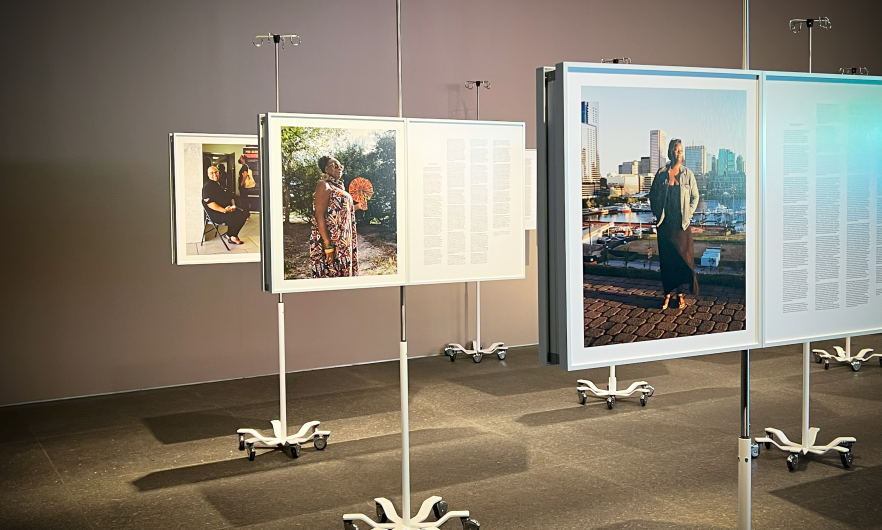Honoring the Heroes of Healthcare Through Art – More Than Conquerors: A Monument for Community Health Workers of Baltimore, MD 2021–2022

The More Than Conquerors: A Monument for Community Health Workers of Baltimore, Maryland 2021–2022 installation is a tribute to the unsung heroes of Baltimore's healthcare system: community health workers (CHWs). Inspired by the Johns Hopkins Center for Health Equity (CHE)’s Amplifying the Lived Experiences of Community Health Workers (ALEC) study, this collection of photographs and narratives reflects the strength, dignity, and vital role that these workers play towards health equity.
This project results from extensive collaboration between Lisa Cooper, MD, MPH and CHE, artist LaToya Ruby Frazier, and CHWs from Baltimore’s community health sector.
Centering the Margins: Uplifting Community Health Workers to Advance Health Equity
Join us on November 21, 2024, at 6 pm at the Baltimore Museum of Art for a free panel discussion that speaks to the role of community-engaged research in the new exhibition LaToya Ruby Frazier: More Than Conquerors: A Monument for Community Health Workers of Baltimore, Maryland 2021-2022.
Hear from local community health workers Madelin Martinez, MPH, Wilfredo (Wil) Torriente, and Latish Walker in a conversation presented by Lisa Cooper, MD, MPH, Bloomberg Distinguished Professor and Founding Director, Johns Hopkins Center for Health Equity, and moderated by Chidinma Ibe, PhD, Assistant Professor and Associate Director of Community Engagement, Johns Hopkins Center for Health Equity. Registration here is encouraged.
Lisa Cooper and LaToya Ruby Frazier, both MacArthur Fellows met in 2015 during a dialogue at The Contemporary, a Baltimore-based museum, where they discovered their shared commitment to addressing social inequities. Cooper, a public health researcher, recognized the power of Frazier's photography in shedding light on marginalized communities' health struggles. "Her art gives voice to people from marginalized groups in society who experience poor health as a result of that marginalization," says Cooper. "And I've used my expertise and platform as a physician and public health scientist to shed light on those same kinds of issues." Their collaboration deepened when Frazier captured a collection of portraits of Baltimore's community health workers, a group that Cooper wanted to highlight for their crucial yet overlooked role during the COVID-19 crisis.
From this portraiture collection, the relationship between CHE and Frazier continued through the ALEC study, led by Chidinma Ibe, PhD, which centered on how CHWs experience social determinants of health (SDOH) both in their personal and professional lives.
The ALEC study consisted of four cohorts of CHWs and utilized photovoice, a participatory visual qualitative research method (research that involves direct collaboration with those affected by an issue being studied for the purpose of action or change) that combines photography and narrative storytelling to capture individuals' lived experiences. In this study, participants were provided with cameras and trained on how to utilize photography as a storytelling medium. Over 5 months, the cohorts met to share their photos and participate in facilitated discussions that focused on the CHWs’ lived experiences and SDOH. Ibe says that the major aim of the study was to “explore the presence and impact of SDOH in the lives of CHWs, the tactics they use to address them, the roles they play in their families and neighborhoods, and the perceived barriers and facilitators of their incorporation into healthcare delivery and community-based organizations.”
Frazier, who is known for her socially engaged photography, transformed the photos and findings of the ALEC study into powerful visual art, representing CHWs’ struggles, triumphs, and the communities they serve. The ALEC study’s role in this artwork offers insight into how policy and community efforts intersect in addressing health disparities.
CHWs have faced unimaginable challenges, from managing chronic illnesses in underserved populations to grappling with the life-altering impact of COVID-19. Through this visual narrative, the exhibit casts CHWs as “conquerors,” emphasizing how these individuals are more than just service providers—they are beacons of hope and solidarity in a fragmented healthcare system. “[CHWs] find the root of the issue and work from the root up,” says Tiffany Scott, a community health worker and key member of the ALEC study team.
The resulting installation, which has garnered critical acclaim and the prestigious Carnegie Prize, was acquired by the Baltimore Museum of Art (BMA) in the summer of 2023 and will be on display at the museum from November 3, 2024 to March 23, 2025. Described as “Monuments of Solidarity,” the photographs reflect the perseverance of CHWs, capturing both the humanity and the complexity of their roles. Each image is a testament to their resilience amid Baltimore's stark healthcare inequities.
As the BMA prepares to open this powerful installation, it invites viewers not only to witness the incredible stories of community health workers but also to reflect on the broader conversation about healthcare access, equity, and the essential nature of frontline care. The More Than Conquerors installation is not only an artistic achievement but a profound social statement, one that bridges art, healthcare, and activism to highlight the necessity of community-centered healthcare.
This monumental installation continues to shed light on the importance of recognizing, honoring, and supporting community health workers. In a time when public health has been critically spotlighted, this project stands as both a commemoration and a call to action—urging us all to support these vital figures in our communities.
For those attending the exhibit at the BMA, More Than Conquerors will serve as a reminder of the critical role community health workers play in fostering healthcare equity. Through the collaborative work of Cooper and Frazier, the stories of CHWs are immortalized in a way that both challenges and inspires us to confront the systems that perpetuate inequality. This installation brings to life the ALEC study’s findings, underscoring the profound impact community health workers have in navigating the complexities of modern healthcare.
As More Than Conquerors opens in November, it is clear the work is more than just art—it’s a vital testament to the resilience of the community health workers who continue to shape the future of healthcare.
